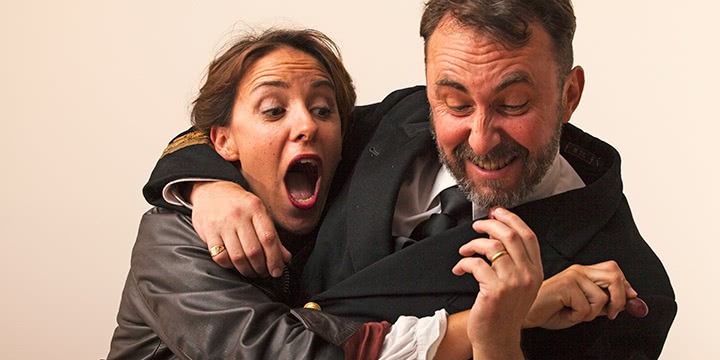The Taming Of The Shrewis arguably William Shakespeare’s most controversial play.
Rife with overt sexism and misogyny, it can be difficult to perform to modern audiences who bear such seemingly different values to those of the Elizabethan era. But has that much actually changed? It’s possible the emotions and opinions that Shrew invokes are more relevant than a cursory study reveals. Sport For Jove refuses to shy away from this contentious piece, and will be reviving its production after a successful run in 2012.
“It’s quite a controversial play and it was so warmly received,” says Danielle King, who plays the protagonist, Kate. “It was good to know you can still do controversial plays and get people to have an entertained evening and still be able to have a conversation about issues that are just as relevant now as they were 400 years ago.”
The Taming Of The Shrew is certainly an ideal vessel for a discussion about contemporary relevance and capacity to offend, given its horrific treatment of the female characters and Kate’s eventual subservience.
“There are opinions, lines and ideas and actions in the play that are incredibly offensive,” King agrees. “But whilst women are still married off for financial reasons or status within their families, it’s relevant. Whilst women are still shamed for speaking out, having an opinion and demanding equal pay, it’s relevant.”
The fact of the matter is that Sport For Jove’s Shrew isn’t a celebration or acceptance of inequality, but a purposeful social commentary on it. “I don’t think it’s the job of theatre or any art form to make it easy,” says King. “I don’t think we need to wrap it up in a bow and solve all of these issues. That’s the point of theatre, to get the conversation going and have an open forum where issues are raised and you empathise with one side and hopefully get to see another point of view.”
Although the production hasn’t been placed in a completely modern setting, it is close enough to home to highlight the gender issues that society is yet to solve.
“Our production has hopefully put it in a context where people can understand it,” King explains. “It is set on a 1920s silent film set. Bianca, who is Kate’s younger sister, is the star, so her value to her father is very much in terms of how much money she can make, and she will be married off to the highest bidder. Kate is an aviatrix who is like Amelia Earhart, because in the 1920s you had all these women taking to the skies. They were doing all of these things that men could do. Kate represents that freedom, but then she’s grounded by her dad and she has to marry Petruchio.”
As awful as the plot is to its female characters, this production does take a more grey approach to the narrative, and particularly the relationship between Kate and Petruchio.
“In our production, we wanted to explore what it would be like if rather than being the torturous, overbearing, awful male that takes her away, Petruchio is someone equally broken and looking for a human connection, just as Kate is,” says King. “He can see Kate’s pain through her anger and he just wants to take her away from this awful life. But she is so angry.
“I’ve been in that situation,” King adds. “‘Life is just so awful, so why would you look for the good?’ You need someone to come along and say, ‘This is good. If you just stop shouting at the world you may be able to take a step towards feeling better about life and humanity.’ In our production, that’s certainly what Kate and Petruchio are trying to do. That’s not saying that he doesn’t torture her. He withholds food and doesn’t let her sleep. It’s brutal and we certainly don’t shy away from it – we call it. We absolutely say that this is bad and barbaric and don’t neaten it up.”
Considering how passionate the production seems to be about emphasising the negative elements of the play in the name of debate and reflection, one wonders about the decision to make Petruchio a more sympathetic character.
“There’s a lot of terminology in the play about a falcon and a falconer,” King replies. “We have looked at how a falconer breaks the wild hunting bird to trust him or her. It’s pretty barbaric, and eventually the first time they release the bird off the leash there’s always a chance it will take off and say, ‘No, fuck you. I’m not coming back.’ But there’s also a very real chance that at the end when Petruchio says, ‘Go on, Kate. You haven’t been allowed a voice during the whole play, what do you want to say to people?’ she might turn around and hit him, scream at him or set fire to the dining table. He had to have as much faith that he’s earnt her respect and given her freedom from the pain to go and figure out how to be a man and wife together.
“That being said, it’s a hard speech and a lot of the lines stick in my throat as a 21st century woman, but I don’t think that’s a reason not to try to find a sense in there.”
The Taming Of The Shrew runsThursday May 5 – Saturday May 7 atRiverside Theatres, thenThursday May 19 – Saturday May 28 atSeymour Centre.


































